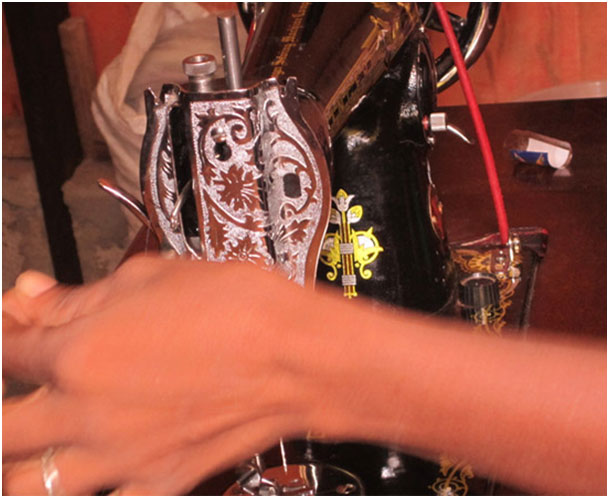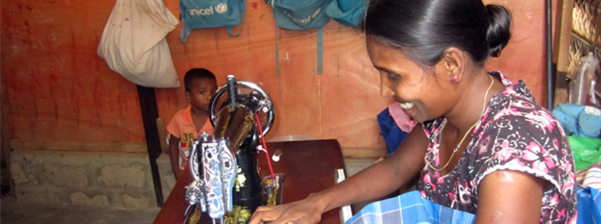A war-free land
11 January 2012 , By – David Brown, Asia Manager for Australian Red Cross
The war is over but now the people of Sri Lanka have the hard task of rebuilding their lives and homes. David Brown, Asia Manager for Australian Red Cross, writes about his personal experiences visiting people who are benefiting from the Red Cross cash grant scheme.
The flat coastal tidelands disappear into the blue and white of the sea and sand in this part of northern Sri Lanka. A silhouetted fallen railway bridge next to the distant dunes is a reminder of the thousands of destroyed homes and government infrastructure from the long war which has cost over 100,000 lives.
There are hundreds of migratory waders foraging in the shallow waters – the elegant white egrets and herons accompanied by sandpipers and plovers who have flown thousands of kilometres to feed in peace. But it won’t be for long because there is a gradual rebuilding in this post-conflict world. For the moment the birds are free of human neighbours because much of the adjoining land is being cleared of mines – a similar, if smaller scale operation to what has taken place on the Cambodia-Thai border for many years.
Many organisations are attempting to respond to the great needs of this ravaged part of the country, which like Vietnam in the 1970s, is now in a challenging period to build a world where the victors and vanquished must continue to live together. This is not easy at any level. To get traction and be able to work in this environment requires excellent relationship management and constant consultation with the authorities.
A partnership
Red Cross is playing a key role in dealing with the acute housing deficit, but unlike many donors it is not building houses for people by contracting foreign companies and workers for this purpose. Red Cross found that after the mixed experience from the tsunami response of 2004, a different response is required, where people build their own houses based on five specific cash grants, each one coinciding with a specific construction task.
Nimal Silva, in charge of the post-conflict recovery program for Sri Lanka Red Cross, comments that community mobilisers and technical officers make regular visits to offer advice and support and that in the great majority of the cases, there is wonderful progress. This is evident in the enthusiasm and interest of the people we meet during four days visit to the area.
Not only does Red Cross provide cash grants for part of the house construction, it also provides a two-step livelihoods grant to enable householders to extend their income opportunities – through goods for a shop, a business or agricultural and fishing activities. A further grant supports the construction of a household sanitation system – almost always placed away from the house, in line with the traditional attitudes in this rural area.
Challenges and successes

Photo: IFRC/ Muththusami Ganeshan
But even here, there will be setbacks, as Red Cross seeks to advise and facilitate rather than direct and control. One lady ignored the recommended list of honest and competent local masons and craftsmen supplied by the community mobilisers, because a man offered her a cut rate. He absconded with her forward payment and she is left 2,800 rupees out of pocket – a large amount for a woman whose husband is ill and unable to work regularly. Although her roof is completed, an interior wall has been badly constructed and has an unhealthy lean. The external septic tank needs lining. In another case, the owner decides to extend the construction area by 40 per cent without considering the additional costs which most likely she will be unable to meet.
In these cases Red Cross offers support and will bring forward payments if there is severe hardship and need, but ultimately the approach is one of shared responsibility for the overall resourcing of the house. Of course, this works wonderfully when families have savings, have small businesses, have possessions they can sell or have relatives overseas who can assist. It’s much tougher for those who are day labourers or seasonal fishermen. And unlike Australia, where a mortgage is part of the landscape for many families, going into debt is not part of people’s preferred approach to financing.
Regardless of the challenges, the evidence shows that houses are being built at a great rate. After less than a year there are 1,000 either constructed or in process. And now other organisations are beginning to show interest in this owner-driven approach.
The program is benefitting people like Manchula Ravichchanthiran, who was caught in the horrific inter-ethnic riots of 1983 in Galle, deep in the south, and then moved north. She has five kids and for the first time in her life will live in a house with electricity.
At a nearby housing site, Savarimuththu and Shantha Jesuratnam stand shyly next to each other in front of their construction.
‘I lost everything but out of all this destruction, I have a beautiful new house,’ says Savarimuththu.
Faced with the scale of need, the Red Cross program aims to expand further as there are still many challenges. However, there is a deep resilience in the fishermen and farmers who we meet – and the Red Cross program is becoming a great success because of their willingness to take up the challenge and look to a future where this beautiful landscape will be free of weaponry and war.
